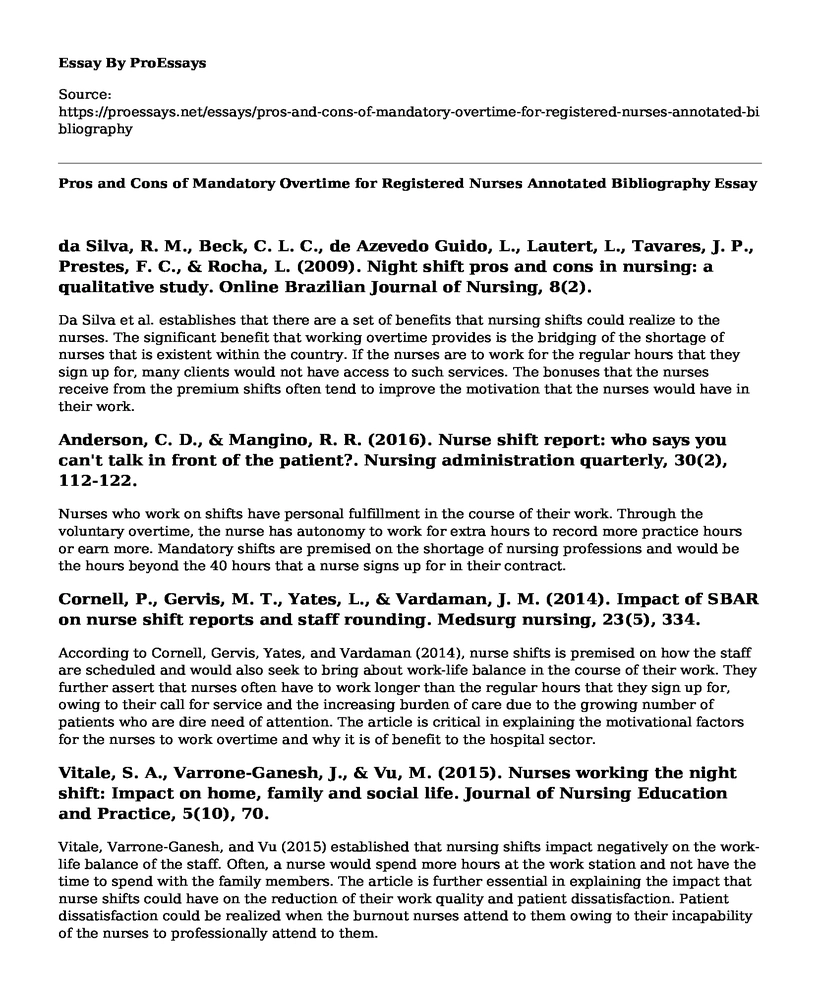da Silva, R. M., Beck, C. L. C., de Azevedo Guido, L., Lautert, L., Tavares, J. P., Prestes, F. C., & Rocha, L. (2009). Night shift pros and cons in nursing: a qualitative study. Online Brazilian Journal of Nursing, 8(2).
Da Silva et al. establishes that there are a set of benefits that nursing shifts could realize to the nurses. The significant benefit that working overtime provides is the bridging of the shortage of nurses that is existent within the country. If the nurses are to work for the regular hours that they sign up for, many clients would not have access to such services. The bonuses that the nurses receive from the premium shifts often tend to improve the motivation that the nurses would have in their work.
Anderson, C. D., & Mangino, R. R. (2016). Nurse shift report: who says you can't talk in front of the patient?. Nursing administration quarterly, 30(2), 112-122.
Nurses who work on shifts have personal fulfillment in the course of their work. Through the voluntary overtime, the nurse has autonomy to work for extra hours to record more practice hours or earn more. Mandatory shifts are premised on the shortage of nursing professions and would be the hours beyond the 40 hours that a nurse signs up for in their contract.
Cornell, P., Gervis, M. T., Yates, L., & Vardaman, J. M. (2014). Impact of SBAR on nurse shift reports and staff rounding. Medsurg nursing, 23(5), 334.
According to Cornell, Gervis, Yates, and Vardaman (2014), nurse shifts is premised on how the staff are scheduled and would also seek to bring about work-life balance in the course of their work. They further assert that nurses often have to work longer than the regular hours that they sign up for, owing to their call for service and the increasing burden of care due to the growing number of patients who are dire need of attention. The article is critical in explaining the motivational factors for the nurses to work overtime and why it is of benefit to the hospital sector.
Vitale, S. A., Varrone-Ganesh, J., & Vu, M. (2015). Nurses working the night shift: Impact on home, family and social life. Journal of Nursing Education and Practice, 5(10), 70.
Vitale, Varrone-Ganesh, and Vu (2015) established that nursing shifts impact negatively on the work-life balance of the staff. Often, a nurse would spend more hours at the work station and not have the time to spend with the family members. The article is further essential in explaining the impact that nurse shifts could have on the reduction of their work quality and patient dissatisfaction. Patient dissatisfaction could be realized when the burnout nurses attend to them owing to their incapability of the nurses to professionally attend to them.
Ratnayaka, R. K. T., Wang, Z. J., Anamalamudi, S., & Cheng, S. (2012). Enhanced greedy optimization algorithm with data warehousing for automated nurse scheduling system. E-Health Telecommunication Systems and Networks, 1(04), 43.
The nurse scheduling system is a computerized system that would be used in the setting of schedules that the hospitals utilize in scheduling shifts for the nurses and overtime hours per week. The scheduling could often lead to dissatisfaction that they realize within their work schedule. The discontent of the nurses due to the burn out could also lead some to consider quitting the profession. When nurses are overwhelmed by their duties owing to the higher workloads that they often do owe to overtime, they fail to communicate well. The articles could be used in explaining factors that lead to medical errors.
Duran, L. S. (2013). Motivating health: Strategies for the nurse practitioner. Journal of the American Academy of Nurse Practitioners, 15(5), 200-205.
According to Duran, the work schedule of the nurses is one of the motivating factors for the employees. The article further recommends that the solution to the overtime issues that the nurses' experience is the meeting of the staff requirements that the hospital facility would require.
References
da Silva, R. M., Beck, C. L. C., de Azevedo Guido, L., Lautert, L., Tavares, J. P., Prestes, F. C., & Rocha, L. (2009). Night shift pros and cons in nursing: a qualitative study. Online Brazilian Journal of Nursing, 8(2).
Anderson, C. D., & Mangino, R. R. (2006). Nurse shift report: who says you can't talk in front of the patient?. Nursing administration quarterly, 30(2), 112-122.
Cornell, P., Gervis, M. T., Yates, L., & Vardaman, J. M. (2014). Impact of SBAR on nurse shift reports and staff rounding. Medsurg nursing, 23(5), 334.
Vitale, S. A., Varrone-Ganesh, J., & Vu, M. (2015). Nurses working the night shift: Impact on home, family and social life. Journal of Nursing Education and Practice, 5(10), 70.
Ratnayaka, R. K. T., Wang, Z. J., Anamalamudi, S., & Cheng, S. (2012). Enhanced greedy optimization algorithm with data warehousing for automated nurse scheduling system. E-Health Telecommunication Systems and Networks, 1(04), 43.
Duran, L. S. (2003). Motivating health: Strategies for the nurse practitioner. Journal of the American Academy of Nurse Practitioners, 15(5), 200-205.
Cite this page
Pros and Cons of Mandatory Overtime for Registered Nurses Annotated Bibliography. (2022, Nov 07). Retrieved from https://proessays.net/essays/pros-and-cons-of-mandatory-overtime-for-registered-nurses-annotated-bibliography
If you are the original author of this essay and no longer wish to have it published on the ProEssays website, please click below to request its removal:
- The Health Issue: Diabetes Screening
- Critical Reflective Analysis of a Counsellor
- Multi-Agency Emergency Event Paper
- Health Disparities Are Often Experienced by Minority Communities Within a Society Essay
- Pros and Cons of Medical Marijuana Annotated Bibliography
- Physical Inactivity: Causes & Consequences for Public Health - Essay Sample
- Essay Example on Diabetes: Type 1 and Type 2 Overview







